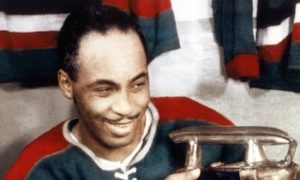
Herbert Carnegie
*Herbert Carnegie was born on this date in 1919. He was a Black Canadian ice hockey player.
Herbert Henry Carnegie was the fifth of seven children born in Toronto to Jamaican immigrants George and Adina Carnegie. George was a janitor with Toronto Hydro, a career that Herb recalls his father liking “about as much as a poke in the eye with a sharp stick,” so George raised his children to value hard work and make something of themselves. At around age eight, Carnegie began dreaming of playing professional hockey when he first laced up a pair of skates and took to the ice. From that moment, hockey was his calling. His older brother Ossie was also an aspiring professional hockey player.
Carnegie's hockey career began in 1938 with the Toronto Young Rangers. It continued in the early 1950s with the Buffalo Ankerites, a team in a mines league that played in northern Ontario and Quebec mining towns. From 1944-45 to 1947-48, he played for Shawinigan and Sherbrooke of the semi-professional Quebec Provincial League and was named most valuable player in 1946, 1947, and 1949. Also, in 1948, Carnegie was given a tryout with the National Hockey Leagues New York Rangers and offered a contract to play in the Rangers' minor league system. However, he was offered less money than he was earning in the Quebec league and turned down all three offers made by the Rangers organization during his tryout.
Returning to Canada to play in the Quebec Senior Hockey League, he played for Sherbrooke St. Francis and the Quebec Aces before moving to Ontario to play a single season with the Owen Sound Mercuries of the Ontario Senior Hockey Association. During his years in the Quebec Senior League, Carnegie played with future Montreal Canadiens star Jean Beliveau and was coached by Punch Imlach.
As a Black man playing hockey in the 1940s and 1950s, Carnegie endured his share of racism. In one famous 1938 incident, Conn Smythe, the owner of the Toronto Maple Leafs, watched Carnegie play as a member of the Toronto Young Rangers. He is alleged to have said either that he would accept Carnegie on the team if he were white or that he would pay $10,000 to anyone who could turn Carnegie white. In Breaking the Ice: The Black Experience in Professional Hockey, author Cecil Harris noted that "some doubt has arisen" about whether Smythe did indeed utter this remark. According to Harris, Carnegie and others believe that racism played an important part in keeping him out of the NHL. Others interviewed point to his decision to refuse the New York Rangers offer to play in their organization.
After his professional hockey career, he began working in the investment industry. 1954, he founded one of Canada's first hockey schools, Future Aces. Through his work in training young hockey players, he became a member of the Order of Ontario and the country's highest civilian award, the Order of Canada.
In 1996, he published his biography, A Fly in a Pail of Milk: The Herb Carnegie Story (Mosaic Press, 1996). His hockey career was recognized when he was inducted into Canada's Sports Hall of Fame in 2001 and the Ontario Sports Hall in 2014. Herb Carnegie died in Toronto on March 9, 2012, at age 92.